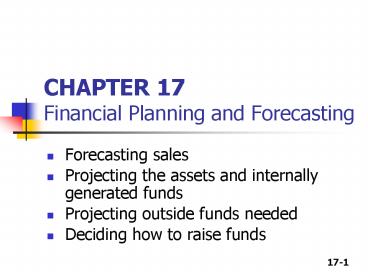CHAPTER 17 Financial Planning and Forecasting - PowerPoint PPT Presentation
1 / 15
Title:
CHAPTER 17 Financial Planning and Forecasting
Description:
Projecting the assets and internally generated funds ... Accts payable & accrued liab. 2006E. 2005. 17-4. Preliminary financial forecast: Income statements ... – PowerPoint PPT presentation
Number of Views:91
Avg rating:3.0/5.0
Title: CHAPTER 17 Financial Planning and Forecasting
1
CHAPTER 17Financial Planning and Forecasting
- Forecasting sales
- Projecting the assets and internally generated
funds - Projecting outside funds needed
- Deciding how to raise funds
2
Preliminary financial forecastBalance sheets
(Assets)
2005 2006E
Cash and equivalents 20 25
Accounts receivable 240 300
Inventories 240 300
Total current assets 500 625
Net fixed assets 500 625
Total assets 1,000 1,250
3
Preliminary financial forecast Balance sheets
(Liabilities and equity)
2005 2006E
Accts payable accrued liab. 100 125
Notes payable 100 190
Total current liabilities 200 315
Long-term debt 100 190
Common stock 500 500
Retained earnings 200 245
Total liabilities equity 1,000 1,250
4
Preliminary financial forecast Income statements
2005 2006E
Sales 2,000.0 2,500.0
Less Variable costs 1,200.0 1,500.0
Fixed costs 700.0 875.0
EBIT 100.0 125.0
Interest 16.0 16.0
EBT 84.0 109.0
Taxes (40) 33.6 43.6
Net income 50.4 65.40
Dividends (30 of NI) 15.12 19.62
Addition to retained earnings 35.28 45.78
5
Key financial ratios
2005 2006E Ind Avg Comment
Basic earning power 10.00 10.00 20.00 Poor
Profit margin 2.52 2.62 4.00 Poor
Return on equity 7.20 8.77 15.60 Poor
Days sales outstanding 43.8 days 43.8 days 32.0 days Poor
Inventory turnover 8.33x 8.33x 11.00x Poor
Fixed assets turnover 4.00x 4.00x 5.00x Poor
Total assets turnover 2.00x 2.00x 2.50x Poor
Debt/assets 30.00 40.34 36.00 OK
Times interest earned 6.25x 7.81x 9.40x Poor
Current ratio 2.50x 1.99x 3.00x Poor
Payout ratio 30.00 30.00 30.00 OK
6
Key assumptions in preliminary financial forecast
for NWC
- Operating at full capacity in 2005.
- Each type of asset grows proportionally with
sales. - Payables and accruals grow proportionally with
sales. - 2005 profit margin (2.52) and payout (30) will
be maintained. - Sales are expected to increase by 500 million.
(DS 25)
7
Determining additional funds needed, using the
AFN equation
- AFN (A/S0)?S (L/S0) ?S M(S1)(RR)
- (1,000/2,000)(500)
- (100/2,000)(500)
- 0.0252(2,500)(0.7)
- 180.9 million.
8
Managements review of the financial forecast
- Consultation with some key managers has yielded
the following revisions - Firm expects customers to pay quicker next year,
thus reducing DSO to 34 days without affecting
sales. - A new facility will boost the firms net fixed
assets to 700 million. - New inventory system to increase the firms
inventory turnover to 10x, without affecting
sales. - These changes will lead to adjustments in the
firms assets and will have no effect on the
firms liabilities on equity section of the
balance sheet or its income statement.
9
Revised (final) financial forecastBalance
sheets (Assets)
2005 2006E
Cash and equivalents 20 67
Accounts receivable 240 233
Inventories 240 250
Total current assets 500 550
Net fixed assets 500 700
Total assets 1,000 1,250
10
Key financial ratios final forecast
2005 2006F Ind Avg Comment
Basic earning power 10.00 10.00 20.00 Poor
Profit margin 2.52 2.62 4.00 Poor
Return on equity 7.20 8.77 15.60 Poor
Days sales outstanding 43.8 days 34.0 days 32.0 days OK
Inventory turnover 8.33x 10.00x 11.00x OK
Fixed assets turnover 4.00x 3.57x 5.00x Poor
Total assets turnover 2.00x 2.00x 2.50x Poor
Debt/assets 30.00 40.34 36.00 OK
Times interest earned 6.25x 7.81x 9.40x Poor
Current ratio 2.50x 1.75x 3.00x Poor
Payout ratio 30.00 30.00 30.00 OK
11
What was the net investment in operating capital?
- OC2006 NOWC Net FA
- 625 - 125 625 1,125
- OC2005 900
- Net investment in OC 1,125 - 900
- 225
12
How much free cash flow is expected to be
generated in 2006?
- FCF NOPAT Net inv. in OC
- EBIT (1 T) Net inv. in OC
- 125 (0.6) 225
- 75 225
- -150.
13
Suppose fixed assets had only been operating at
85 of capacity in 2005
- The maximum amount of sales that can be supported
by the 2005 level of assets is - Capacity sales Actual sales / of capacity
- 2,000 / 0.85 2,353
- 2006 forecast sales exceed the capacity sales, so
new fixed assets are required to support 2006
sales.
14
How can excess capacity affect the forecasted
ratios?
- Sales wouldnt change but assets would be lower,
so turnovers would improve. - Less new debt, hence lower interest and higher
profits - EPS, ROE, debt ratio, and TIE would improve.
15
How would the following items affect the AFN?
- Higher dividend payout ratio?
- Increase AFN Less retained earnings.
- Higher profit margin?
- Decrease AFN Higher profits, more retained
earnings. - Higher capital intensity ratio?
- Increase AFN Need more assets for given sales.
- Pay suppliers in 60 days, rather than 30 days?
- Decrease AFN Trade creditors supply more capital
(i.e., L/S0 increases).































